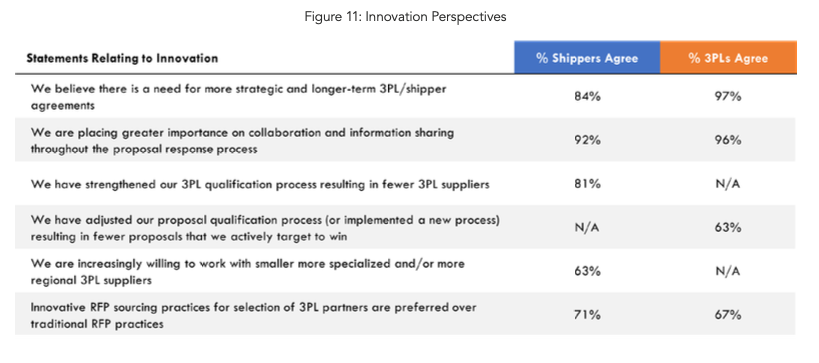How Satisfied Are Your Shippers? 3PL Study Reveals

The latest 3PL study from NTT Data, Penn State, and Penske, titled "The Power of Partnerships: Exploring Collaboration Through Data and Innovation," delves into the role of partnerships within the shipper and 3PL industry.
The study focuses on three key areas: the benefits of partnerships, the flow of data, and moving beyond the hype of new technology. It examines shippersa' satisfaction with 3PL providers, the extent of logistics outsourcing, and the critical role of IT capabilities in these partnerships.

Image: Innovation in Shipper / 3PL Relationships. Source: 3PL Study 2024.
The Details:
- Shipper Satisfaction: 78% of shippers are satisfied with 3PL providers’ IT capabilities, a 3% drop from last year.
- Outsourcing Trends: 87% of shippers are using outsourced logistics services, down from 89% last year and 94% in 2021.
- 3PL Consolidation: 85% of shippers are reducing or consolidating 3PLs, a nearly 10% increase year-over-year.
- Outsourced Services: Commonly outsourced services include domestic transportation, freight forwarding, warehousing, customs brokerage, international transportation, and transportation planning and management. Warehousing outsourcing rose to 65% from 43% in 2022.
- IT Capabilities: Only 49% of shippers are satisfied with 3PLs’ IT capabilities, down from 54% last year and 58% in 2022. Key desired IT solutions include transportation management planning (62%), warehouse/distribution center management (59%), transportation management scheduling (57%), and advanced analytics and data mining tools (50%).
Why It Matters:
The study highlights shifting dynamics in the shipper-3PL relationship, emphasizing the need for 3PLs to enhance their IT capabilities to meet shippers' evolving demands. The slight decline in satisfaction and outsourcing suggests that shippers are becoming more selective and consolidating their 3PL partnerships.
This trend indicates that 3PLs must continuously innovate and improve their service offerings to maintain competitiveness. The emphasis on essential technology solutions underscores the critical role of IT in optimizing logistics and strengthening partnerships, reflecting broader trends in the industry toward data-driven decision-making and efficiency improvements.